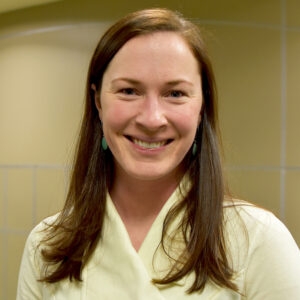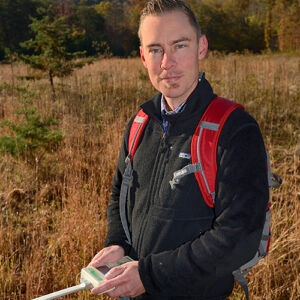GCC Faculty Affiliates Co-locate to Steger Hall to Create Novel Synergies
August 9, 2021

August 9, 2021
The Fralin Life Sciences Institute is co-locating researchers from across three colleges at Virginia Tech to Steger Hall to foster interdisciplinary collaborations to tackle threats to the environment and society. Following in the footsteps of similar moves over the last year, the co-location will bring together innovative scientific minds to encourage innovative research.
The newest residents of Steger Hall include three affiliates of the Global Change Center (GCC): Todd Schenk (CAUS), Meryl Mims (COS), and Jacob Barney (CALS) Their research programs focus on various aspects of global change, including invasive animals and plants. Invasive species pose significant risks to agriculture, natural resources, infrastructure, recreation, rural livelihoods, and human health. In the U.S. alone, invasive species cause more than $20 billion in damages each year. “One of the major strengths of the GCC is the way our community fosters rewarding collaborations from a range of disciplines on campus and beyond,” says Assistant Professor of Biological Sciences Meryl Mims. “As a lab, we are thrilled to join many of our GCC colleagues in Steger Hall and look forward to collaborations in a range of exciting areas, including the biology and policy of invasive species management in a rapidly changing world.”
“The latest strategic move of faculty into Steger Hall will bring together expertise from three colleges to build on current campus-wide momentum on invasive species. Along with the recent co-location of expertise on climate change, ecological forecasting, and infectious disease in Steger Hall, we are building a diverse community studying these complex problems in the field, at the bench, and using advanced computational approaches,” said William Hopkins, associate executive director of the Fralin Life Sciences Institute and director of the Global Change Center.

Todd Schenk, Associate Professor of Urban Affairs and Planning, School of Public and International Affairs.
Todd has extensive research and consulting experience working on environmental policy and planning, and collaborative governance issues in North America, Europe, Asia, Africa and the Middle East. His research interests include: collaborative governance at the science-policy interface, civil discourse to build empathy and understanding, climate change adaptation, and serious games for action research. Along with fellow GCC affiliates, Todd is an active member of the Virginia Tech Invasive Species Working Group. This Interdisciplinary group focuses on bridging the science and policy of invasive management in order to better understand barriers and opportunities and advance best practices. They bring together biologists and resource managers, social scientists, policy experts, and other stakeholders to facilitate new partnerships both locally and nationally.

Meryl Mims, Assistant Professor of Biological Sciences, Department of Biological Sciences.
Meryl’s research investigates how species’ traits and environmental attributes interact to influence community and population structure of aquatic organisms. Her research integrates the fields of population, community, and landscape ecology, and she uses a suite of approaches including population and landscape genetics, spatially explicit individual-based models, traits-based inference, species distribution models, and multivariate statistical tools. The overarching goal of her research is to uncover, understand, and predict differential response of aquatic species to a changing landscape and climate. Meryl works to bridge fundamental work in freshwater population and community ecology with applied conservation and management needs. Current projects include, SMARTSIM: Simulating Metapopulations and Removal Tactics for Strategic Invasives Management and work through the Virginia Tech Stream Team.

Jacob Barney, Associate Professor of Invasive Plant Ecology, School of Plant and Environmental Sciences.
Jacob Barney’s research focuses on the processes and consequences of invasive plant species on our natural and managed ecosystems. In relation to global change, the Barney research group studies how invasive plants respond to novel climate scenarios, which may increase the number and distribution of habitats susceptible to invasion. He is particularly interested in risk assessment as it pertains to reducing the risk of future invasions, and has applied this extensively in studying the risk of introducing exotic bioenergy crops. His research also focuses on identifying the impacts of invasive plants in a holistic manner to better understand the consequences to biodiversity and ecosystem processes. Jacob has also taught numerous courses on biological invasions and weed science, including workshops and lectures through the Virginia Tech Invasive Species Working Group. These include the “Biological Invasions: Confronting a Crisis” workshop and the “Advocacy, Science, and Policy of Invasive Species” graduate course which featured a trip to Washington D.C.





